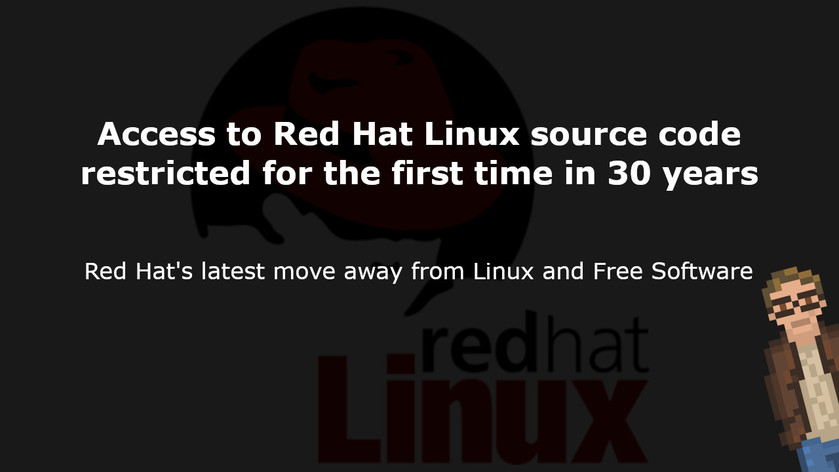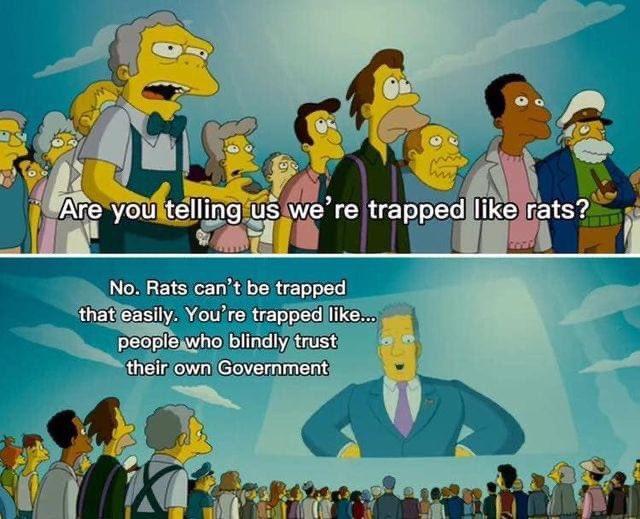Back in 2019, when IBM purchased Red Hat for $34 Billion dollars (b-b-b-biiiilion!), I predicted that Red Hat would begin to distance itself from everything that had made it famous (and profitable) -- specifically, "Linux" and "Free and Open Source Software".
Red Hat quickly proved Lunduke right
Then -- right on cue, the very next year -- Red Hat canceled CentOS (the free, community supported Linux distribution based on Red Hat Enterprise Linux).
The motivation behind this move was obvious.
One of the primary reasons for the existence of CentOS was to be "binary compatible" with Red Hat Enterprise Linux. Obviously CentOS was seen, by IBM, as possibly cutting into Red Hat sales... so it needed to die.
Was this a good business decision? Tough to say. But, putting the business and profitability aspects aside for a moment... it was difficult to see this massive shift in a years-long Red Hat policy as anything other than a declaration that Red Hat was moving away from their "Free Software" roots.
The CentOS community was angry about the change. And, rather quickly, a few new "CentOS replacement" Linux distributions sprang to life (including, most notably, Rocky Linux and AlmaLinux). Both existing far removed from the corporate control of Red Hat... but still based on the Red Hat Enterprise Linux source code (which had been made available since the dawn of time).
At the time of the death of CentOS, I made a clear statement that this was only the beginning. That, whatever else happened to Red Hat and IBM over the coming years, we would see the Linux giant rapidly pull away from all things "Linux".
Red Hat proved Lunduke right... again
Flash forward to 2023. Red Hat (under IBM) lays off 760 employees. Including a number of people who worked specifically on Fedora (the community Linux distribution) and other Free Software projects. Red Hat even eliminated the Fedora Project Manager role completely.
Once again this was -- on a practical level -- a dramatic reduction in Red Hat's investment in Linux and Free Software.
Maybe it was a good business move... or maybe it wasn't. Regardless, Red Hat was moving away from Linux, and they weren't hiding it.
At the time of those announcements, I made a statements along the lines of: "A little birdy tells me there is more coming. This won't be the last time we see Red Hat pulling away from Linux and Open Source this year."
Hey, Red Hat! Stop proving Lunduke right!
Well, wouldn't ya know it, Red Hat just announced -- earlier this week -- that they will be no longer be providing the source code for Red Hat Enterprise Linux publicly.
That source code -- which was previously used by CentOS... and then the CentOS replacement distributions of Rocky Linux and AlmaLinux -- would now only be made available to paying Red Hat customers with a current subscription... and usage of that source code must be handled "in accordance with their subscription agreement".
Once again, a massive shift in Red Hat policy. The source for Red Hat Linux (both before and after the word "Enterprise" was tacked onto it) has always been made publicly available. This is, quite literally, a core -- dare I say fundamental -- change to how Red Hat has always worked... dating back to the 1990s.
Both AlmaLinux and Rocky Linux have issued statements regarding this change.
From the AlmaLinux statement:
"This change means that we, as builders of a RHEL clone, will now be responsible for following the licensing and agreements that are in place around Red Hat’s interfaces, in addition to following the licenses included in the software sources. Unfortunately the way we understand it today, Red Hat’s user interface agreements indicate that re-publishing sources acquired through the customer portal would be a violation of those agreements."
Obviously, this move by Red Hat was specifically designed to attempt to stop both AlmaLinux and Rocky Linux from continuing to operate.
One side note: Many in the Linux and Free Software world have objected to Red Hat placing their source code "behind a paywall". The insinuation is that this move is a violation of the GPL. It is not. The only requirement to provide source code, in the GPL, is when you also provide a binary to a user. If that binary is part of a subscription, you are under no obligation to provide the source code publicly. In fact, Richard Stallman himself has repeatedly advocated for exactly this sort of arrangement (when it makes sense).
On the other hand...
Red Hat's subscription agreement prohibits the "re-publishing" of the source code obtained through the Red Hat Enterprise Linux subscription. Now that is a problem.
A large majority of that source code is licensed under variations of the GPL. Which specifically allows for re-publishing (and modification). Which would make any attempt by Red Hat to stop any such re-publishing extremely difficult... and, quite possibly, even a violation of the GPL.
The teams at Red Hat have to know this. Many of them are long-time industry veterans with significant experience working with the GPL. All of which raises many questions about whether this policy was conceived by the long-term Red Hatters... or if it was mandated by executives at IBM with less experience in the area.
It's not all bad news
This may seem pretty bleak. As if the world's largest Linux company was, in practical terms, completely turning their backs on Linux and the world of Free Software.
That said... there remains some bright spots.
As of this moment, Red Hat still funds quite a lot of development in both Fedora Linux and desktop Linux in general. Making Red Hat one of the largest contributors to Linux-based software in the corporate world.
If Red Hat continues down their current path -- dropping long-standing support of Free and Open Source Software -- we are likely to see an increasing exodus away from the Red Hat ecosystem. Which could mean direct benefits to the other players in the Linux world (along with opportunities to new companies who would seek to compete with Red Hat... but in a more "open" way).
So.
Will Red Hat make more moves to distance itself from Open Source and Linux over the rest of 2023?
Or will the long time Linux and Free Software advocates -- who still exist within Red Hat -- manage to "right the ship" and return Red Hat to its former glory?
I don't think we'll need to wait very long for our answer. I have a prediction... but I'd rather not say it out loud for fear of making it come true.
Personally? I would prefer not to be proven right again.
Copyright © 2023 by Bryan Lunduke. All rights reserved. The contents of this article are licensed under the terms of The Lunduke Content Usage License.


















